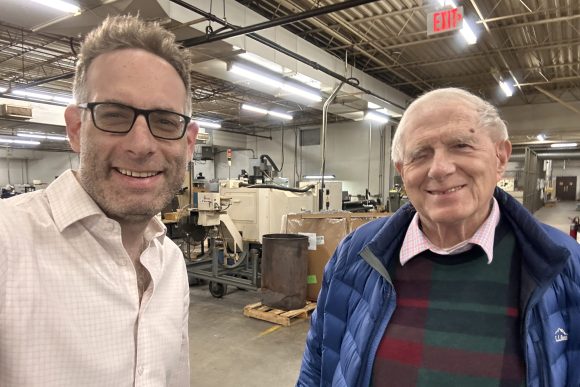I don’t know about you, but when the tariffs hit on Liberation Day, April 2nd, we were like “Oh @#$%, is this really happening?” We watched our portfolios crash in real time. Our company lost half our profit from one deal overnight, and honestly, we had no clue what was coming next.
On today’s show, Lloyd and I are discussing how tariffs blindsided the machining industry and how maybe we’re seeing the same panic-to-adaptation cycle we lived through during the pandemic.
Listen on your favorite podcast app using pod.link.
View the podcast at the bottom of this post or on our YouTube Channel
Facebook: https://www.facebook.com/swarfcast
Instagram: https://www.instagram.com/swarfcast/
LinkedIn: https://www.linkedin.com/company/todays-machining-world
Twitter: https://twitter.com/tmwswarfblog
*************
Link to Graff-Pinkert’s Acquisitions and Sales promotion!
*************
Interview Highlights
Adapting to Tariffs
As used machinery dealers at Graff-Pinkert, we watched deals evaporate when Trump’s tariffs hit. But after months of uncertainty and a dead-quiet first half of 2025, things seem to be finally picking up—maybe even ramping up fast.
Maybe this is a little bit like how the machining business reacted during Covid. First came panic, then indecision, then gradually people figured out how to adapt. For two months after the tariffs hit, nobody in the machinery business did anything. Everyone was waiting to see what would happen next. But now Graff-Pinkert has been selling more machines, and several customers have told us that they’re getting a lot of work.
One of our customers imports steel from Europe and stores it in Nucor’s warehouses. The end client assumes price risk rather than paying financing premiums. It’s supply chain innovation born from necessity.
China: The Economic War
Lloyd discusses the United States’ economic war with China. The manufacturing disparity is staggering—China produces several thousand ships annually while the United States produces five. China holds a lot of cards because so many companies have moved operations there, making us dependent on their supply chain. But China has enormous problems too. Their birth rate is falling and they’ve overbuilt enormously in real estate, with virtually whole cities that are empty. Still, they’re playing the long game and believe that over time, they will defeat the United States economically.
AI and the Future of Machining Jobs
We explore an unexpected career question: should young machinists choose cam-operated screw machines over CNC programming? With AI advancing rapidly in coding, the manual hands-on skills required for multi-spindle setup might prove more durable than programming skills that could be automated.
Lloyd, at 80 years old, has become surprisingly adept with ChatGPT. I use AI for everything from triaging my son Abe’s pneumonia symptoms to writing persuasive emails. I even had a debate with Claude.ai about negotiation tactics when writing to a customer—Claude initially disagreed with my approach of acknowledging that a million-dollar machine price might seem high, but came around when I explained the Chris Voss negotiation philosophy of the accusations audit.
Podcast: Play in new window | Download




1 Comment
Hi Noah and Lloyd,
Thanks again for the very nice article and podcast you did on me several weeks ago.
I’m buying some items I need at retail prices and buying and selling other items on pure speculation.
CNC prices seem to be stable, Legacy items go for $.05 on the dollar or less if you are patient.
John